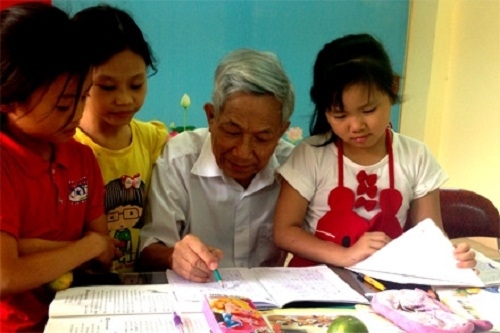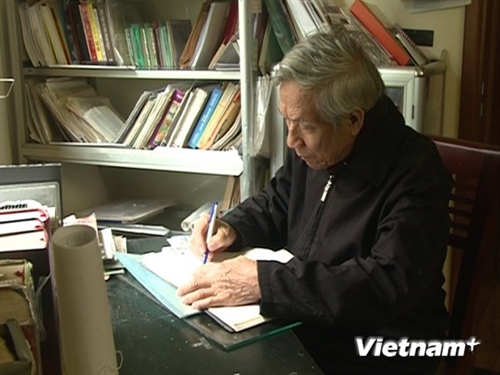 Features
Features

Now at the age of 85, veteran teacher Nguyễn Trà has devoted himself to teaching poor and disabled students for almost 25 years.
 |
| Patient work: Teacher Trà is helping his students to deal with a difficult exercise. VNS Photo |
by Tiến Minh and Hà Nguyễn
Now at the age of 85, veteran teacher Nguyễn Trà has devoted himself to teaching poor and disabled students for almost 25 years.
The sight of disabled children and street children asking locals in Phương Liên Ward of Hà Nội’s Đống Đa District for directions to Trà’s house in order to learn how to read and write, is so common that everyone in the ward knows about the teacher.
Whether it is hot or cold, Trà still teaches a group of about 20 students at the Trung Tự Communal House.
Trà recalls when he was retiring in the 1990s, he was asked to join the management board of the Communal House. One day a woman brought her child to the house to play and learn. But the child could not finish his mathematics exercises because they were very difficult. His mother asked Trà for help. Several days later, the child again brought his math problems and asked Trà for help.
Gradually, members of the board, one after another, brought their descendants to Trà to ask him to teach them difficult lessons.
The Hướng Thiện class was officially established soon after, Trà said.
Every Thursday and Saturday at 8am, children in the ward arrive at the Communal House for Trà to help them deal with difficult lessons.
“My aim is not to impart new knowledge but to guide them to understand difficult exercises while focussing on educating them by telling them stories about obeying their parents, and how to conduct themselves to be polite to adults and live peacefully with friends,” Trà said.
A student name Nguyễn Thị Lý said she would never forget Trà’s story My Son’s Eyes Are Mine, which was about a mother who loved her son so much that she donated her eyes to him because his sight had been bad since childhood. But after he grew up, the son refused to recognise his mother because she was blind. After his mother died, the son read her letter, which she left behind and came to know the truth. He deeply regretted his filial impiety but by then it was too late.
Good reputation spreads, and Trà’s classes are becoming more and more crowded, sometimes having up to 30 students.
After opening for several months, Trà said he saw street children looking at the class with eager eyes.
“I called them and asked them details about their lives. I was very sad on hearing that the children worked to earn a living without an opportunity to go to school. I invited them to join the class and presented them with books,” Trà said.
Hoàng Văn Lai, a street child from the midland province of Phú Thọ, said that thanks to Trà’s wholehearted effort, he now knew how to read and write very quickly.
“I am very happy because I can read letters from my parents and the newspapers as well,” Lai said.
Nguyễn Thu Lan, whose father died when she was very young and whose mother is a waste collector, often comes to class without eating anything. Trà buys her bread and sticky rice apart from notebooks and text books.
Another student is Lương Văn Sinh, whose father is a drug addict and whose mother died of disease.
At the age of 10, Sinh had to give up school and went to live with his grandmother. Trà came to the grandmother’s house to encourage Sinh to return and study while asking his friends to help Sinh continue his studies at school.
Now Sinh has finished secondary level and plans to join a vocational school.
Bùi Văn Quyết, an official from Phương Liệt Ward said that thanks to Trà’s efforts, students in the ward have made more progress compared with earlier.
Parents are happy because their children have no time to play on the streets or be affected by social evils, Quyết said.
Three foreign languages
After finishing high-school graduation, Trà continued to teach a few students while he studied to pass the university examinations to enrol at Hà Nội Teacher’s College No.1.
After graduation from the college in 1957, he taught physics at the Nguyễn Trãi Secondary School where his fellow teachers and students never forgot him. He was a very well-known teacher who knew three foreign languages – English, French and Russian.
He revealed how he learned one foreign language well. In 1947, during the anti-French War, his family evacuated to the northern province of Thái Bình. At that time, books on foreign languages were very rare, and the whole class had only one or two dictionaries.
Trà wanted to have one for his own, but it was not sold anywhere. He thought of a solution. After class, he would borrow a dictionary from his classmate and copy it in his notebook.
“In three months, I had written down all the words from the French-Vietnamese dictionary,” he recalled.
Assistance from family
Since the Communal House was busy, Trà’s class had to move to his house with the support of his wife and children.
In addition, they still donate money to maintain the class. Trà’s paternal and maternal grandchildren, who are university students, are often excited to help Trà in his teaching.
To encourage his students to study hard, he organises a trip twice a year to Văn Miếu (Temple of Literature), the Mausoleum of President Hồ Chí Minh, the Hà Nội Zoo or the Botanical Gardens.
“My students are very happy to discover these locations where they can learn a lot,” he said.
His efforts paid off when last year President Trương Tấn Sang sent a letter to Trà praising his contribution to the community. VNS
 |
| Endless efforts: Teacher Trà prepares lessons in his library. Photos VNS vietnamplus.vn |




